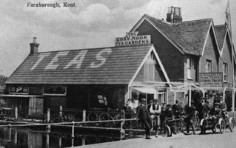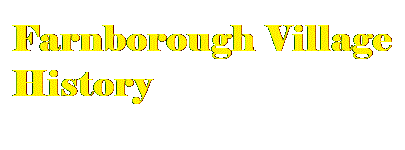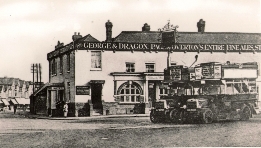


FOSTER RAINE
On Sunday 16th July 2017 a new plaque on Farnborough War Memorial was dedicated in memory of Signalman Foster Raine. Signalman Foster was killed in 1942 whilst serving in the Royal Navy in the waters off Nigeria.
He has no known memorial and had been living in Farnborough Parish at 20 Tubbenden Drive for a number of years prior to his death. His brother George and sister-in-law were in attendance at the service, which was led by the Rector of Farnborough, The Revd, Matthew Hughes.
memorial_foster_raine/IMG_5167%20-%20Copy.jpg) |
memorial_foster_raine/IMG_5168%20-%20Copy.jpg) |
About Foster Raine
Our mother and father first met when he came down from his home in Yorkshire to study and train as a Methodist Minister in the Isles of Scilly. The Methodists worked on the basis that if you could last 3 years in Scilly then the African jungles would be a walk over! Mother was one of seven sisters in an old island flower farming family. They married just before the start of the Great War and our father joined the army as a Padre in the Royal Army Medical Corps and served in France. Sadly he died before the end of that war and so Foster and I never knew him, but we were fortunate to be born and brought up in the Isles of Scilly, an ideal start for any boy for which I shall always be grateful.We were brought up on St Martins where our home was on a gentle slope of flower fields overlooking a beautiful bay, with views to the uninhabited Eastern Isles. The white, sandy beach was just 100 yards from our front garden, where palm trees grew and the views could outdo any tropical island.
|
|
|
Foster was a splendid swimmer but never had any interest in boats, which seemed unnatural to me. He was a year older than me and we did most things together – apart from boating! We swam and played games, mainly cricket, and I repeated almost everything Foster did, right until his death, at a respectful year’s distance. At the age of 10 Foster went to Shebbear, a Methodist College in North Devon where he played cricket (he became an excellent off spin bowler) and football for the school.
After 5 years at Shebbear he matriculated and then went to Sheffield where he lived in digs with one of our many Scillonian aunts and her husband who had settled there. He took 5 years articles with a firm of Chartered Accountants and, at the end of that time, qualified with honours. I did precisely the same a year later, but a simple pass – no honours! I continued to work at the same firm in Sheffield (where I had already met Joyce) until the war broke out. I then joined the Navy, did three months training as a signalman learning a whole new vocabulary (both technical and profane), qualified and went to Lowestoft, the small ships base, where I joined a newly built motor minesweeper. We did our trials and were posted to Sheerness.
Meanwhile Foster, after qualifying with honours, had come to Orpington to live with another of those many aunts who resided, with her husband, at 20 Tubbenden Drive – which later became our home. He lived here for 3 years, working at De Loittes – a very large firm of Chartered Accountants in London – until the war broke out. Foster then also volunteered for the Navy, which seemed to me an unlikely choice considering his lack of interest in boats! After three months training as a signalman he qualified and was also drafted to Lowestoft, and from there to Harwich and Marconi – an old coal fired fishing trawler converted for mine sweeping.
|
|
|
|
On our way down from Lowestoft to Sheerness we berthed for a night in Harwich. I looked out for Marconi, spotted her at the sea wall making ready for sea, and found Foster on board. We had time, before she sailed, for half an hour’s chat, both of us probably realising that it might well be our last meeting. It was. We waved to each other as Marconi left and disappeared round the Felixstowe point for her night sweeping the East Coast shipping lane to make it safe for convoys and other shipping. Next day we proceeded to Sheerness to do our nightly sweep of the East Coast lane.
So that was my brother Foster. He was a fine sportsman, playing cricket and football for his school and cricket for one of the Farnborough clubs. He was also a tremendous, dedicated businessman, assured of a partnership in De Loittes had he returned from the war; a great character and, most of all to me – my dear brother.
George Raine
FARNBOROUGH VILLAGE